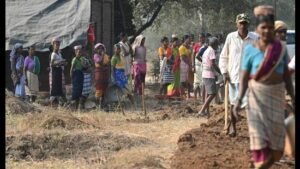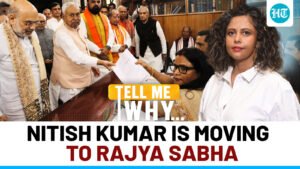
Dear Reader,

On a Sunday morning at the taj mahal tea house – a cozy mumbai café know for its pakoras, chaat, and fin teas-we are just settling into a discussion of our book of the months when our book of the monthi By two men at the next table. Deep in conversation, they pass a hardcover book between them-Sometimes poring over its pages, sometimes examining the cover with care.
Curiosity gets the better of us. After a less failed attempts to identify the title, one of our group finally Leans over and Asks, “Forgive Us for Butting in -We’re a Book Club and Just Had to Ask, what book is that?”
One of the men smiles. “It’s a new book – You’re the first people to ask us about it in public. This is the author, Rahul bhatia.”
And so we meet Rahul Bhatia and Fellow Journalist M. Rajshekhar, And Get An Unexpected First Look at the Identity Project: The Unmaking of a Democracy, A Book That GoCoCOON BOLD GO ON TO BOLDE ANE TO BOOLD TALD 2024 and the Non-Fiction Book of the year at the Kerala Literature Festival. Soon we’re all seated at the same table, and conversation flows easily, as it often does among book lovers.
That serendipitous encounters leads to an unforgettable conversation with rahul bhatia –nd later, a masterclass at nmimims mumbai with my mba students –on jourtism, power, power, and the narrows India. In an era of contested facts and fragmented attentions, bhatia reminds us that stories, rigorously reported and responsibly told, are how we make sense of power. Here are edited excerpts of our conversation:

You Grew up in Dubai. Tell us about your childhood reading.
My parents worked at banks in dubai – My mother worked in the treasury department, and my father was in information technology. My mother loved jokes and puns, and so our home was filled with books of Limericks, Joke Books, Books Full of Insults, and Comics – Mostly Mad Magazine and Asteix. My Father Preferred National Geographic and PC Magazine.
My mother tried hard to get me to read the classics, but my attention wandered. I tried shakespeare, dickens, melville, but they did nothing for me. I kept returning to teenage detective stories, Clarke, Asimov, and All the Science Fiction I Could Find.
You Stodied Design at the Pratt Institute, New York, Worked as Art Director at Ogilvy and Mather, But Ended Up Finding Your Calling in Journalism. You’ve written for reuters, Cricinfo, Tehelka, Mint, The Caravan, The Guardian, The New York Times. What Draws You to This Profession?
It’s the relationship, the personal growth, the getting to know sources over months of interviews. It’s that feeling that everything in the world is available for me to write about. I am obsessed with written things down as they happy. The narrative really, really matters. Today you find powerful people exerting a great Amount of Narrave Control, Because It Allows them to Shape Reality in a Certain Way.
The Truth is Much More Complicated, but it’s not something that you see often, and I wanted to put all of that toge.
You’ve written on Politics, Tech, Godmen, Industry and Cricket. How do you choose your stories?
Back in 2011, One of My Editors at the Caravan Said, “Why don’t you write a story on arnab goswami?”
I spent five months interviewing dozens of current and former employees. Some genuinely admired Him – But Over 98% described horror upon horror inside the newsroom. You don’t get that kind of consistency from people with just an axe to grind. There was something else going on.
When the story came out, I was a little nervous. I’D Never Written About Someone With Such a Public Persona. I didn’t know how he’d react.
Apparently – For a brief while – Times now Considered Suing The Caravan and Me. But their legal advice was: don’t. Everything was found-check.
Once you’ve done that kind of story and survived, the natural question banks: What Next? One Assignment was Investigating Why Bridges Kept Collapsing Across India. Another was about n. Srinivasan, Who Headed India Cements and Became the Boss of Indian Cricket.
Writing about cricket became a way to study power –how men gain it, use it, misuse it. It was almost sociological, revaling the workings of our social.
Because you can’trol outstcomes, but it’s really important to write down what happy. The more complex and layered, the better. The story should have strong characters, something should Haappen to them, there should be an antagonist of some kind, and there should be a journey. I wonder if I can play Around with time, with transitions, with mood. Each Story has to be Harder than the last. There’s no point in doing it otherwise.
In your book, the identity project, you weave togetra the story of aadhaar cards, citizenship laws, and the interminable wait of riot Victims for justice along with a history of the far Right. How did this book Haappen?
I had just write a piece about Facebook free basics, which was really Facebook’s way of creating a version of the internet that had Facebook at the center.
Reporting it was interesting if I saw how policy is created in India. I spoke to people who had conversations with the government, who was in the room where the person is actually happy, and it was like not not sharing I have heard of in my life. (Read the story for more.) I Somebody had just said, ‘there’s a secret door, and we’ll let you peep in for a little whose’. And it blew my mind to see how the government interactions with industry. You hear about it sometimes with India’s Large Companies. But this was Facebook behaving a little clumsily, so they were not able to cover their tracks in the way that more subtle operators would. I Wrote about it.
A friend who read this story advised me to look at aadhaar. He was right. Critics were being threatened, reporters were complaints of dropped stories, and serial data leaks were bent downplayed.
Eventually, I Realized This Needed My Full Focus – So I Quit My Job at Reuters to write the book.
Aadhaar was pitched as India’s digital utopia. Your Reporting Reveals It Became Something Darker?
As I Explred Aadhaar’s origins, I discovered an intriguing parallel with an identally id project commissioned by lk advani in 2000, almost ten years before aadhaar. Now that Advani had emerged as a potentially Major character in the book, I tried to understand his motivations. That took me into the world of the Hindu right, its beliefs, and the methods of its supporters. The book expanded from an aadhaar story to a story about callusness, about the implementation of powerful surveillance technology in a Country that Occasionally Unleashes Horofic VioLENES HONS OWN Citizens.
Your Book Shows How Aadhaar’s Critics were erased. How dos that happen?
I spoke with reports, economists, and lawers who were disheartened by the role the press. They told me of news stories that were carried in the opinion section, of the press’s unwillingness to dig deeper into the numbers used to justify aadhaar. Reporters explained what Simply Never Made It ITO The Papers. That’s the subtext here: If it does not exist in the news section, it doesn Bollywood at all. At the same time, critics were disinvited from conferences, they receiving legal notices.
You’ve written about Goswami, Nilekani, The Government and Godmen – How Ever Been Threatened?
I think there is this fear that if you annoy power, something bad will Haappen. But the Truth is, if you take the longer term view, which is that if I don’t write about power, it just becoming more powerful, and my environment acquaintance more and more Unequal.
I have a family that works every single time I have a big story coming out. But what is the alternative? It is to just be quiet, to do noting. But if you think in terms of Society at Large, You Feel Like, Okay, I Need to Write this. I need to write about a person who does not have a voice. You Tell yourself: i’ll do it –nd trust that the environment will protect me.
There is another kind of censorship as well, isn’t there -the Kind of Being Systematically Ignored. Your book has made it to nyt’s top list of 2024 books. But the coverage of your book in India seems to have been quite subdued?
Yes, I have been told about things like this. About People Calling, Saying, Just given Invite this person to your literary festival. Just don’t review this book. It’s a very modern kind of censorship. You don’t really know whiters you’re being censored or not, and that messes with your mind. Like, sometimes I was telling somebody, have I written the book I think I have, or am I just overesting myself? After putting in the years of work, you’re like, there’s an external force that is making you doubt yourself.
I am grateful for what i’ve got so far. The book has been reviewed by the nyt, the guardian, the time, the economist, and other places; Serious academics are written about it; A scholar is using it as a basis for a serial essay about violence; School kids and college students are reading it. This is more than I could ask for.
Does having been published internationally and having written for publications like the guardian, the new yorker and the nyt give you more credit?
It works two ways. Yes, Each of these names is a gatekeeper of some sort, and if you have gone through that gate, you acquire a certain something.
But Again, Having Written for some of these places can also be seen in countesses like ors as a marker of allism. And not just allitism, but also like, oh, you’re anti-national. So it’s double edged.
Despite all you’ve uncovered about manipulation and censorship, you keep going. What Gives You Faith that Truth Still Wins – How Can Our Readers become part of that fight?
If you want to do something, you can’t always do it on your own. You neededs, and the press is an ally.
When I was working on my facebook story, I reached out to people who were in a position to see a lot and maybe unhappy. Somemes they don’t know who to talk to, and you reach out to them, and you’re like, these are the publications I worked for. So that marks you out as a serial sort of writer.
It turns out that there are a ton of people who are really given agree with what’s happening in their companies. And they will slip you little bits of information, and they’ll tell you, this is all I can do. Now, go talk to other people. Sometimes, That’s All You Need-You Don’t Need a full-Blown Whistleblower. You just need somebody to point you in the right direction.
,
Ninety Minutes Later, it’s time to wrap up. But the students cluster Around Rahul Bhatia, Reluctant to let go. One Asks: “i’d love to be a writer, but my family says it’s not financially viable viable – What would you advise?”
“You can’t do a traditional cost-benefit analysis on this, ‘he replies.
And so it goes on, until at last he must go away, leaveing behind a sense of courage and inspiration in the air. And also a set of book recommendations.
Rahul bhatia’s book recommendations
1. Despite the state By M. Rajshekhar
Why? A brilliant exploration of why Indian States Fail, Written in an Engaging Travelogue Style.
2. Stasiland by Anna Funder
Why? A Gripping Account of Life Under East Germany’s Survelance Regime, Relevant for Understanding State Control.
3. Works by Supriya Sharma
Why? Her Election Travelogues Offer Deep Insights INTO Indian Politics Through Grassroots Conversations.
Begin this list with reading The Identity ProjectWith the story of nisar who looks for justice in a nation where democracy is under threat. And write to us with your picks, your favorite books on Politics and Current Events.
(Sonya Dutta Choudhuri is a Mumbai-Based Journalist and the founder of sonya’s book box, a bespoke book service. People and places




